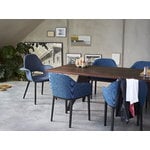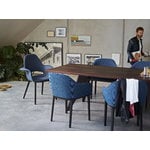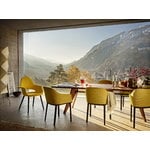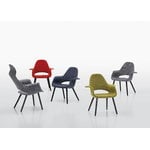Vitra’s Organic Chair is an iconic masterpiece designed by Charles Eames and Eero Saarinen, two notable visionaries of modern design. Organic Chair was designed in 1940 for 'Organic Design in Home Furnishings’, a competition organized by New York’s MoMA with an aim to challenge designers to create new kind of furniture design that would be based on free, natural forms. A combination of an airy, flowingly shaped upholstered seat and diagonally placed wooden legs, the Organic Chair won in two categories of the competition thus becoming an icon of the new, organic style of design. The expression of the Organic Chair remains fresh, harmonic and interesting also in the 21st century, making it a popular chair in both domestic and communal spaces around the world.










Organic Chair, oak - chocolate/black
Vitra
Description
Vitra’s Organic Chair is an iconic masterpiece designed by Charles Eames and Eero Saarinen, two notable visionaries of modern design. Organic Chair was designed in 1940 for 'Organic Design in Home Furnishings’, a competition organized by New York’s MoMA with an aim to challenge designers to create new kind of furniture design that would be based on free, natural forms. A combination of an airy, flowingly shaped upholstered seat and diagonally placed wooden legs, the Organic Chair won in two categories of the competition thus becoming an icon of the new, organic style of design. The expression of the Organic Chair remains fresh, harmonic and interesting also in the 21st century, making it a popular chair in both domestic and communal spaces around the world.
Product details (10)
- Colour
- Oak, chocolate brown, black
- Width
- 72.5 cm
- Depth
- 67.5 cm
- Height
- 82.5 cm
- Seat height
- 35 cm
- Seat cushion
- Polyurethane foam
- Upholstery fabric
- Credo fabric (95% new wool, 5% polyamide)
- Seat material
- Laminated seat shell
- Base material
- Oak
- Warranty
- 10 years (product must be registered at manufacturer's website within 3 months of the purchase date)
- Product ID
Reviews (0)
Sustainability
The Product Sustainability Framework, our criteria of sustainable design, helps you find the most sustainable products in our selection. Read below which sustainability criteria this product has met.
Working conditions & labour 7/9
-
Equal opportunities for all employees
-
Commitment to UN Global Compact, fair compensation for all employees
-
Corporate responsibility requirements defined and communicated for suppliers
-
Systematic work for improved inclusion and well-being in the workplace
-
Transparent supply chain
-
Suppliers' compliance to a code of conduct ensured
-
Compliance to the UN Guiding Principles on Business and Human Rights ensured in the supply chain
-
Direct suppliers audited and certified
-
Support for community involvement in the supply chain
Eco-friendly production 7/9
-
Fair and resource-wise water-use in production
-
No incineration or landfilling of returned items
-
No use of endangered species as materials
-
No direct environmental emissions or waste (excl. GHGs) from production
-
Production and material sourcing that respect biodiversity, animal rights, and natural ecosystems
-
Material-efficient and ecological packaging
-
No potentially harmful chemicals used in own production
-
The sustainability of direct suppliers' production is addressed and monitored
-
Positive impact on nature’s well-being through operations that regenerate natural ecosystems
Climate impact 5/8
-
Company's direct greenhouse gas emissions identified and commitment to reduction
-
Product's carbon impact identified and commitment to reduction
-
Guidance on energy- and eco-efficient use of the product
-
Contribution to climate initiatives beyond the brand’s direct operations
-
100 % renewable energy in own production and operations
-
Low-carbon or compensated transportation
-
Carbon footprint of the product calculated and goals set to reduce it
-
Carbon neutral or carbon negative product
Sustainable materials 5/6
-
Sustainable and long-lasting material choices
-
No harmful or hazardous substances
-
Responsible raw material sourcing and production
-
Materials suited for circularity: monomaterials, recyclable finishings, renewable or recycled contents etc.
-
Ecological materials: natural, biodegradable, recyclable or recycled contents
-
Outstanding materials in terms of innovativeness, responsibility, sustainability and circularity: local production or sourcing, 100 % recycled content, C2C-certification etc.
Circular design 5/5
-
High aesthetic quality promoting long-term use of the product
-
Technically durable product design and material choices
-
Design for enduring life-long quality
-
Design and support for product maintenance, repair and upgradability
-
Innovative circular design solutions: circular service system, resale platform, remanufacturing, collection of used products, etc.












